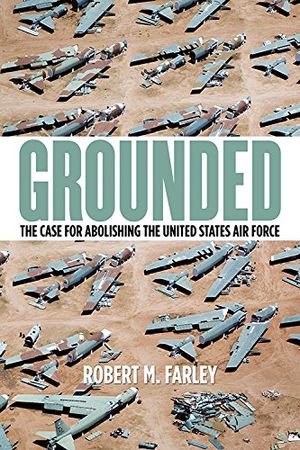Is It Time to Abolish the U.S. Air Force?
A political scientist says yes.
/https://tf-cmsv2-smithsonianmag-media.s3.amazonaws.com/filer/89/c1/89c18ffb-a508-436f-838f-249c2dd9114d/sunset_f-16.jpg)
A senior lecturer at the University of Kentucky’s Patterson School of Diplomacy and International Commerce, Robert Farley is the author of Grounded: The Case for Abolishing the United States Air Force (University Press of Kentucky, 2014). Farley spoke with Associate Editor Diane Tedeschi in August.
Air & Space: Do you think there was ever a time when we needed an independent Air Force?
Farley: No. I think it was a serious mistake to give the Army Air Force its independence in 1947, just as it was a mistake to make the Royal Air Force independent in 1918. The experience of the U.S. Army Air Force in World War II demonstrated that American airpower could win decisive victories as a part of pre-existing military organizations.
What do you think the Air Force has gotten right?
The Air Force has gotten a lot right. Especially in the period between 1972 and 1991, when it identified many of the internal problems that had caused difficulties in Vietnam, and engaged in the slow, hard process of reform that was necessary to create an organization that could act as a partner for the Army and the Navy. This included training reform, procurement reform, and doctrinal reform.

Where do you think the Air Force could improve?
The Air Force can give up on the idea that airpower will, eventually, replace and subsume other forms of military power. This is an idea that has animated airpower thought since [Italian General Giulio] Douhet surveyed the carnage of the First World War, and it’s baked into the DNA of the USAF. I’m not sure there’s a more poisonous notion in the history of American military thought: It’s caused doctrinal problems, training problems, procurement problems, and has been the source of tension between the services. The problem is that this idea is tied deeply to the reality of Air Force independence; it’s what provided the justification for independence in the first place. Giving up on the idea that airpower is really the dominant form of military power means, in some sense, giving up on the ideas that the founders of the USAF fought for.
Why do you think we should take the radical step of abolishing the Air Force?
Airpower is more important than ever, but it’s also more integrated than ever with other forms of military power. B-1Bs provide small teams of U.S. soldiers and Marines with what amounts to close air support. This is a degree of integration that was difficult to imagine in 1947. Our institutions can, under pressure of war, adapt to this new need for force integration, but they don’t adapt easily. The bureaucratic walls inevitably create distance, often in ways that no one expects. The resource advantage that the United States has enjoyed over its rivals since the end of the Cold War is waning. It’s easy to overstate the threat, but it’s imaginable within our lifetime that Chinese military spending will exceed American. This means that we won’t always have the luxury of an unwieldy structure for managing our military.
Couldn’t a similar argument be made for abolishing either the U.S. Navy or U.S. Army?
Not really. The U.S. Navy represents what I would like a military organization to look like: A coherent whole that has the tools it needs to exercise influence and force on a global scale. Naval airpower exists as part of this integrated whole, no different than the surface or subsurface components of the fleet. Similarly, the Marine Corps has an organizational vision that integrates airpower, seapower, and landpower, and that can make doctrinal and procurement decisions based on that vision. The Army and the Air Force don’t. They need each other in order to successfully wage war, yet they have different strategic visions, different cultures, and different priorities. The actual process of warfighting often smooths these differences down, but they recur when it’s time to rebuild and restructure the force. This leaves both organizations inefficient at their jobs.
How long would it take to integrate the existing Air Force into the Navy and Army? Do you have an estimate of the monetary cost?
Years, but less than a decade. The Air Force was larger in 1947 than it is today, and faced a more serious set of procurement decisions, yet the military and civilian establishment pulled off major reforms in a fairly short period of time. Right now the Russians are reconfiguring their airpower institutions—in the wrong direction, I think—and it hasn’t proven all that disruptive thus far.
It will cost a lot, and the costs will be front-loaded. The Air Force will undoubtedly lose talented people, as will the Army and the Navy as the process uncovers redundancies. In the long run, however, I suspect that changes to the procurement process will save money, and in any case will make for more effective warfighting.
Would you do away with the Air Force Academy as well? Or keep it and funnel its graduates directly into the Navy and Army?
That’s a level of detail that goes beyond what I’ve explored in the book, but the general thought would be to do our best to reduce the cultural barriers that have developed between the services over the years. In this case, it’s hard to see how maintaining a separate institution for the undergraduate education of would-be aviators and aviation support personnel would fit into developing a coherent force. That said, I don’t doubt that some use could be found for the Colorado Springs campus that maintained its connection with the history and traditions of American airpower.
Regarding air power, naval power, and ground forces, would you rank all three of equal importance? If not, how would you rate them?
This is the wrong question. Virtually every useful way of thinking about military force involves the cooperation of land, sea, and air assets. Even ships at sea depend on land sensors, land-based air, and—for some navies—land-based anti-ship missiles. That we’re still asking the wrong question, 30 years after Goldwater-Nichols [a Department of Defense reorganization act signed by President Ronald Reagan in 1986], is an artifact of how we’ve decided to organize our military forces. Ground, sea, and air aren’t naturally in competition with one another, but when you decide to organize your military around an Army, a Navy, and an Air Force, you put them into competition.
Independent of your opinions about the Air Force, how do you foresee the future of air power?
I think that airpower will continue to play a critical role in American national power in the next century. Everything that the military does requires command of the air, from ISR [intelligence, surveillance, reconnaissance] to basic logistics. I think, however, that some of the trends we’ve seen over the past decade or so will continue, particularly the shift from manned to unmanned platforms. I also worry that the cost of high-end, manned platforms will continue its upward trajectory, making it even more difficult to purchase aircraft in the numbers necessary to make the U.S. military function as it should. What effect will that have on the Air Force? The Air Force has weathered the beginnings of the “unmanned” cultural crisis better than most have expected, but as more and more critical capabilities shift in the unmanned direction, that may change. I also wonder if the increasing need for technical integration between the three services will make more people see the light about how unnecessary bureaucratic boundaries make life harder for everyone.
What has been the reaction to your book?
The book has met a lot of resistance, but in general the resistance has been respectful and productive. The people pushing back against the argument have been willing to revisit and make clear some core assumptions about why we need an air force, and that’s been a useful intellectual exercise. I’ve received a few private emails from connected people who find the argument compelling, but no one is waving the book on the floor of the Senate. My hope is that the book will find its way into the hands of think-tankers, low-level staffers, and students, who could eventually have an impact on policy.
